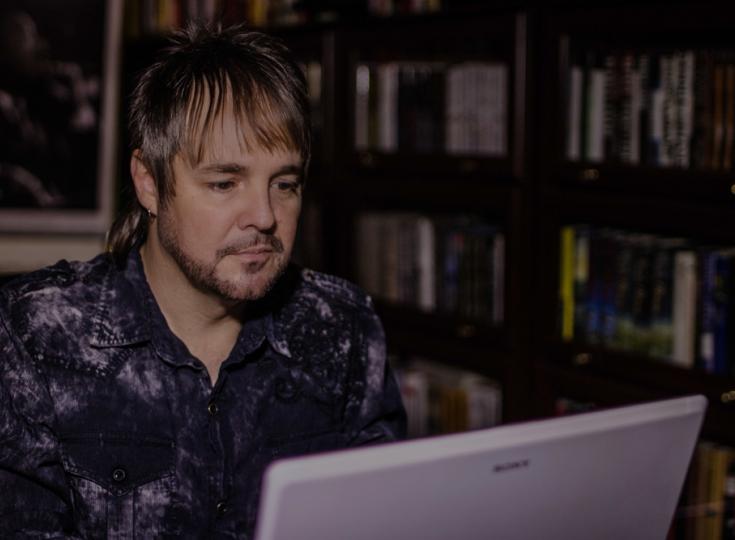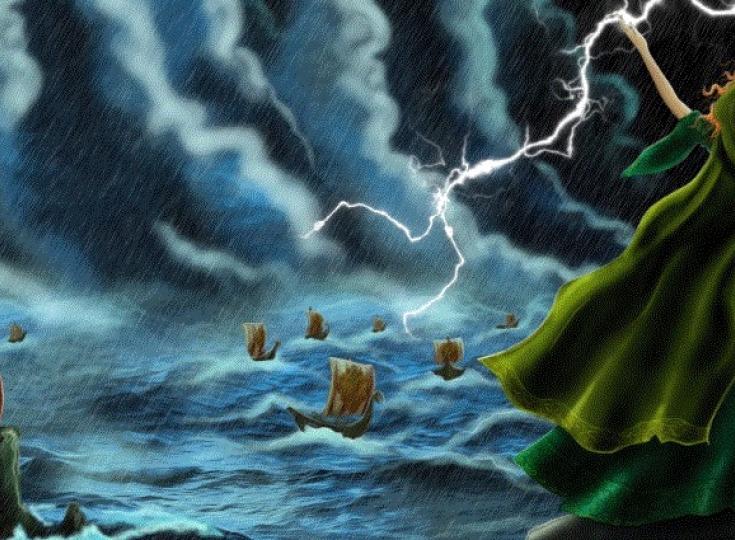Matthew Harffy - Action-Packed Thriller Set in the Forests of Wessex
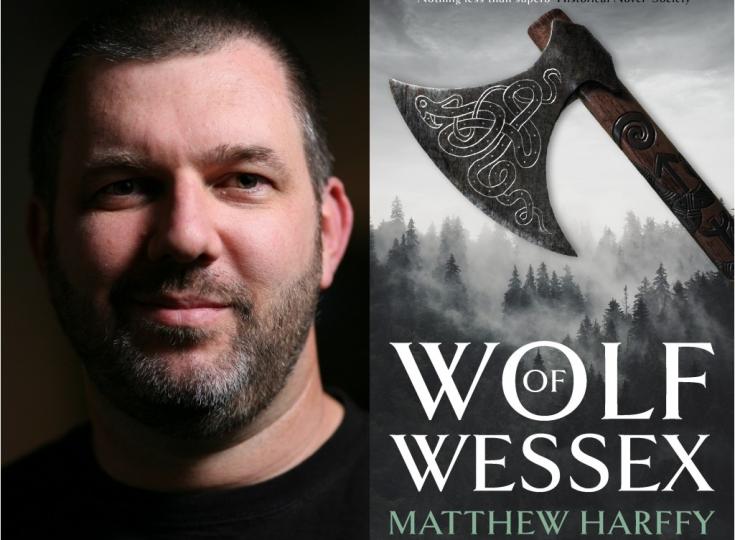
Matthew Harffy lived in Northumberland as a child and the area had a great impact on him. The rugged terrain, ruined castles and rocky coastline made it easy to imagine the past. Decades later, a documentary about Northumbria's Golden Age sowed the kernel of an idea for a series of historical fiction novels. The first of them is the action-packed tale of vengeance and coming of age, THE SERPENT SWORD. Matthew has worked in the IT industry, where he spent all day writing and editing, just not the words that most interested him. Prior to that he worked in Spain as an English teacher and translator. Matthew lives in Wiltshire, England, with his wife and their two daughters. As our Author of the Day, Harffy tells us all about his standalone novel, Wolf of Wessex.
Please give us a short introduction to what Wolf of Wessex is about.
Wolf of Wessex, is my first departure from the seventh century, which is the period in which my series, The Bernicia Chronicles, is set. Wolf of Wessex takes place a couple of centuries later in the early years of the Viking Age and follows the tale of an aging warrior, Dunston, as he tries to find a man’s vicious murderers, keep the victim’s orphaned daughter alive and uncover the dark secret that threatens to plunge the kingdom into war. The book has been very well received, with The Times calling it “a treat of a book”.
What inspired you to write about the forests of Wessex AD 838?
I love the outdoors and have been interested for a long time in survival and bushcraft, such as is taught by the likes of Ray Mears, who has presented many successful documentaries and written lots of fabulous books on the subject of how people from different cultures live as one with the land, harmoniously harnessing nature to support them. I live in Wiltshire, England, which in the ninth century was part of Wessex, and near my house is one of the remaining parts of the ancient woodland that was known as Selwudu (Selwood, or Sallow Wood). Walking among the trees there, I found my mind transported back to a time when much of the land was covered in woodland, and I began to think what it would have been like to live alone deep in the forest away from the noise and concerns of the world. And so, Dunston was born.
Tell us more about Dunston. What makes him so special?
Dunston is a retired warrior, who has removed himself from the violence of fighting for his king, to live out the rest of his years in peace. He promised his wife he would never return to the warlike existence that had scarred him both physically and mentally, and he has been content to fulfill that vow for the years following his adored wife’s death.
But despite his promise to his dying wife, and his desire to be left alone, Dunston cannot turn his back on a defenseless orphaned girl when he stumbles on her murdered father. Soon, he has to call on all of his skills of survival and stealth garnered from a lifetime in the wilderness. Before the end, Dunston must confront his long-buried past – becoming the man he once was and embracing traits he had promised he would never return to. The Wolf of Wessex must hunt again; honor and duty demand it.
I love the idea of a man that people consider to be past his prime but is still vital and able to not only survive, but stand against younger men and bring them to justice.
How much research did this novel require from you?
Having already published six novels in the Bernicia Chronicles series that is set a couple of hundred years earlier, I had lots of books about the Anglo-Saxon period of English history. But I did need to research the specific details of the events leading up to 838, which is when the story takes place.
What was the most interesting aspect of this research?
I think the most interesting thing was finding out about King Ecgberht of Wessex (also spelled Egbert, Ecgbert, or Ecgbriht). He was the grandfather of King Alfred, and the more I read about his life and his reign, the more I wonder whether he might have as much right to the epithet ‘Great’ as his more famous grandson.
Besides writing, what other secret skills do you have?
It isn’t much of a secret, but I used to sing in a rock band called Rock Dog!
You grew up in Northumberland. How has this influenced your writing?
I spent a few years of my childhood in a small village called Norham on the banks of the River Tweed. I think the sparseness of the population, the wild windswept hills, the rocky coastline, the vastness of the North Sea and the crumbling castles that dot the landscape, all seeped into my psyche and influence how I think of the past.
Why did you decide to include a dog in the story?
I started writing Wolf of Wessex a few weeks after we had bought our dog, Blue. He is not a huge hound like Odin, but he has merle coloring and, as I am the one at home with him all day, we take long walks together in the countryside. It is not much of a stretch of the imagination to see how Odin and Dunston are the braver, tougher, more heroic versions of Blue and me!
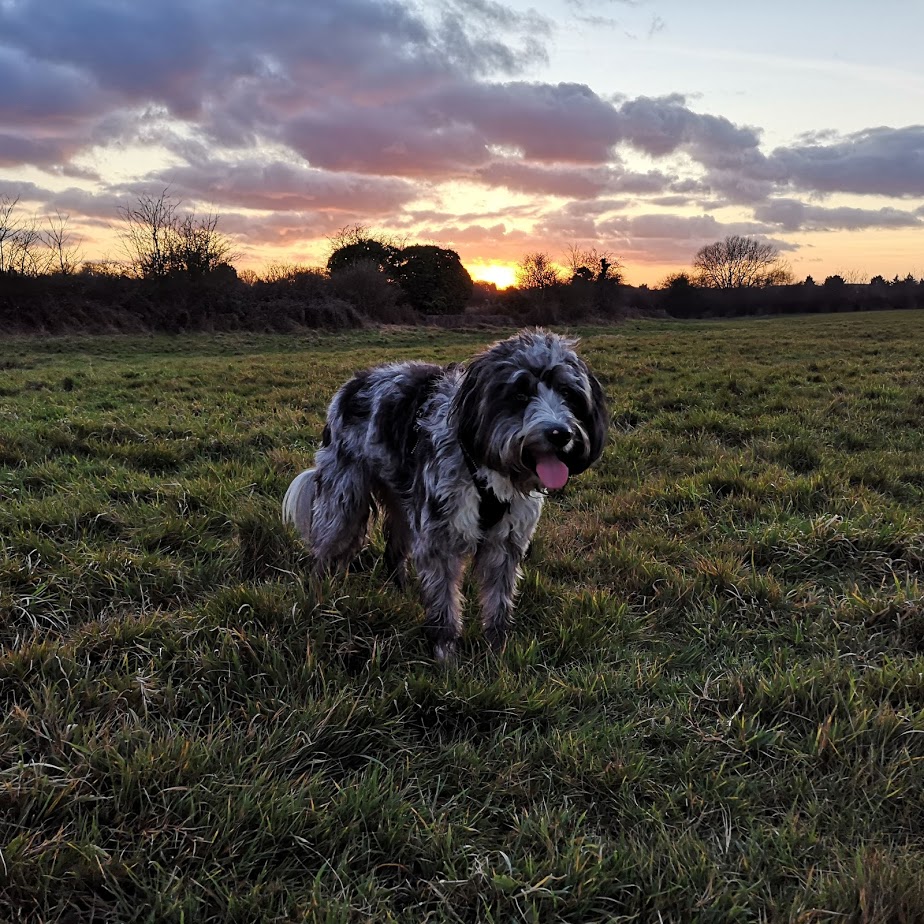
Which of the characters in the Wolf of Wessex was the most challenging to create?
Probably the orphaned girl, Aedwen. I try hard to be true to the character of a teenage girl, but of course, it is not as easy for me to imagine what it is like as it is for me, as a man close to fifty years old, to imagine Dunston, with his aches and pains. Having said that, I have two daughters, so I did draw on my experience of watching them grow up and how they approach different situations at various times in their young lives.
What did you have the most fun with in this book?
The fight scenes. I love writing battles and fights and describing how Dunston managed to overcome some of the odds stacked against him was great fun.
I also really enjoyed writing the chapter where Dunston and Aedwen meet the charcoal burners. I planted a couple of Easter eggs in the novel that link back to the Bernicia Chronicles too.
The book is action-packed from the start. How did you pull that off?
I write the kind of books that I like to read. If they are getting boring to write, they need some more action and something to drive the narrative along. I try to make the chapters short and each one needs to propel the story forward in some way.
Do you have any interesting writing habits? What is an average writing day like for you?
I think my writing day is pretty boring! I work from home and aim to write 2,000 words a day from Monday to Friday. I take breaks to walk Blue and I listen to film scores or other music without lyrics, or nature sounds like rain or the sea, while I write to drown out distractions.
While I still had a day job, I had to find time to write wherever I could, and so I became very adept at writing in all kinds of places, from the back seat of my car while waiting for my daughters to finish an activity, to planes, hotel rooms, trains, and park benches. Now, most of my writing is done at home and sometimes in the local library.
What are you working on right now?
I am now halfway through the as-yet-untitled eighth novel in the Bernicia Chronicles series. I am also working with a production company on bringing the series to the screen. The project is called The Serpent Sword, after the first book in the series. For more details about the exciting project, please check out www.theserpentsword.com.
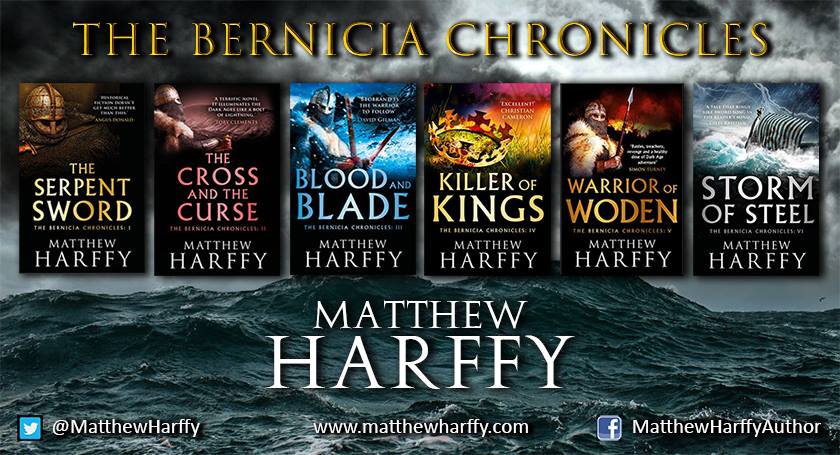
Where can our readers discover more of your work or interact with you?
I always love hearing from readers. My website is www.matthewharffy.com. And I am active on Facebook, Twitter and Instagram. I also have a Patreon page.
http://matthewharffy.com/
https://www.theserpentsword.com/
https://www.patreon.com/MatthewHarffy
https://www.facebook.com/MatthewHarffyAuthor
https://twitter.com/MatthewHarffy
https://www.instagram.com/beobrand/
